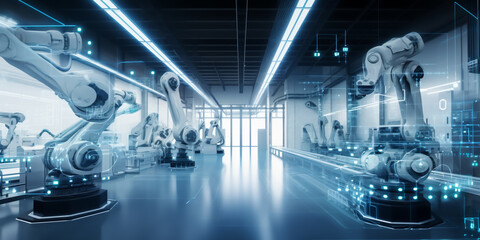
Transforming Manufacturing: Embracing Automation
Outline
- Introduction to Manufacturing Automation
- The Automotive Industry: A Pioneer in Automation
- The Rise of Automation in Car Manufacturing
- Electric Vehicles and Automation
- Automation in Electronics Manufacturing
- Precision and Efficiency in Production
- Key Players in Electronics Automation
- Transforming the Food and Beverage Industry
- Automation for Safety and Efficiency
- Major Companies Implementing Automation
- Revolutionizing Logistics with Automation
- Enhancing Supply Chain Management
- Leading Logistics Automation Firms
- Practical Applications of Automation in Manufacturing
- Robotic Process Automation (RPA)
- Case Studies: FANUC and Tesla
- Advantages of Manufacturing Automation
- Increased Efficiency and Speed
- Cost Reduction
- Improved Quality Control
- Enhanced Workplace Safety
- Data-Driven Decision Making
- Optimizing Workforce Potential
- The Future of Automation in Manufacturing
- The Rise of Collaborative Robots (Cobots)
- AI and Machine Learning in Manufacturing
- IoT Integration for Real-Time Data
- 3D Printing and Custom Manufacturing
- Autonomous Mobile Robots (AMRs)
- Virtual and Augmented Reality for Training
- Cloud Computing and Big Data Analytics
- Energy Efficiency and Sustainability
- Conclusion
- FAQs
- What is Manufacturing Automation?
- Which Industries Benefit from Manufacturing Automation?
- How Does Automation Enhance Quality Control?
- What Role Do Collaborative Robots Play in Manufacturing?
- How Does Automation Promote Sustainability?
Transforming Manufacturing: Embracing Automation
Introduction to Manufacturing Automation
Manufacturing automation integrates advanced software and robotic systems to streamline production processes. This approach enhances efficiency, minimizes human intervention, and encompasses various functions like processing, assembly, inspection, inventory management, and production planning. While automation promises to revolutionize operations, it also raises concerns about job displacement. However, automated systems typically handle monotonous, dirty, or dangerous tasks, allowing humans to focus on more complex and safer work.
The Automotive Industry: A Pioneer in Automation
The Rise of Automation in Car Manufacturing
Automation in the automotive industry is a prime example of how technology can transform traditional manufacturing processes. The market for automation in this sector is predicted to grow by $1.95 billion from 2021 to 2026. Automation helps streamline assembly lines, enabling processes such as welding, polishing, and assembling, particularly with the rise of electric vehicles. Major automotive companies like Ford, General Motors, Mercedes-Benz, and BMW are leading the charge in using automation to enhance production.
Electric Vehicles and Automation
The shift towards electric vehicles (EVs) has further accelerated the adoption of automation in car manufacturing. Automation enables the precise and efficient assembly of complex EV components, ensuring high standards of quality and performance. This technological integration not only boosts production efficiency but also supports the development of sustainable automotive solutions.
Automation in Electronics Manufacturing
Precision and Efficiency in Production
The electronics manufacturing sector greatly benefits from automation due to the intricate and delicate nature of the components involved. Automation enhances production efficiency, quality testing, and assembly processes, ensuring consistent output.
Key Players in Electronics Automation
Leading companies in this sector, such as Emerson Electric Co., Pegatron, Quanta, Siemens, and Wistron, leverage automation to maintain competitive edges and deliver high-quality electronic products to the market.
Transforming the Food and Beverage Industry
Automation for Safety and Efficiency
In the food and beverage industry, automation optimizes production processes, ensuring food safety, efficient packaging, and adherence to quality standards. Automated systems facilitate labeling, stacking, and packing, reducing the risk of contamination and enhancing overall efficiency.
Major Companies Implementing Automation
Prominent companies like Nestle, Sysco Corporation, and Cargill utilize automation to streamline their operations, ensuring high standards of quality and efficiency in their production lines.
Revolutionizing Logistics with Automation
Enhancing Supply Chain Management
Automation plays a crucial role in the logistics sector, enhancing supply chain efficiency, inventory management, and delivery speed. Technologies such as automated storage and retrieval systems, robotic picking, and automated guided vehicles optimize logistics operations.
Leading Logistics Automation Firms
Companies like Daifuku, KION Group, Locus Robotics Corp., Dematic, and Honeywell International, Inc., are at the forefront of adopting automation technologies to revolutionize logistics and supply chain management.
Practical Applications of Automation in Manufacturing
Robotic Process Automation (RPA)
Robotic Process Automation (RPA) has been pivotal in manufacturing for years, enabling companies to achieve better results in shorter timeframes. RPA involves the use of software robots to automate repetitive tasks, improving efficiency and accuracy.
Case Studies: FANUC and Tesla
FANUC, a leading robot manufacturer in Japan, produces over 22,000 industrial robots monthly for clients like Apple and Tesla. Tesla, under Elon Musk’s leadership, has implemented a fully automated production strategy, utilizing cloud computing and AI for its autonomous self-driving cars.
Advantages of Manufacturing Automation
Increased Efficiency and Speed
Automation accelerates manufacturing processes, saving time and energy while increasing production speed and reducing errors.
Cost Reduction
Automation lowers labor costs, reduces production wastage, and minimizes downtime, resulting in significant cost savings for manufacturers.
Improved Quality Control
Automated processes ensure consistent and high-quality output, reducing the risk of defective products and enhancing customer satisfaction.
Enhanced Workplace Safety
Automation reduces the risk of workplace injuries by handling hazardous tasks, protecting the human workforce and improving overall safety.
Data-Driven Decision Making
Automated systems facilitate data collection and analysis, helping companies make informed decisions and improve processes based on real-time insights.
Optimizing Workforce Potential
Automation enhances job satisfaction and retention by allowing human workers to focus on more complex and fulfilling tasks, thereby optimizing workforce potential.
The Future of Automation in Manufacturing
The Rise of Collaborative Robots (Cobots)
Collaborative robots, or cobots, work alongside human workers, performing repetitive tasks and allowing humans to handle more complex responsibilities. The cobot market is projected to reach $7.5 billion by 2027, highlighting their growing significance.
AI and Machine Learning in Manufacturing
Artificial intelligence (AI) and machine learning enhance automation by detecting errors, identifying patterns, and suggesting improvements, leading to more efficient and intelligent manufacturing processes.
IoT Integration for Real-Time Data
The Internet of Things (IoT) integrates devices that collect and share data, improving real-time scheduling and productivity. IoT-enabled automation systems enhance visibility and control over manufacturing operations.
3D Printing and Custom Manufacturing
3D printing accelerates the production of custom components and prototypes, reducing lead times and costs. This technology allows for greater flexibility and innovation in manufacturing processes.
Autonomous Mobile Robots (AMRs)
Autonomous Mobile Robots (AMRs) navigate uncontrolled environments autonomously, transporting materials and performing repetitive tasks, thereby increasing efficiency and reducing the need for human intervention.
Virtual and Augmented Reality for Training
Virtual and augmented reality (VR and AR) technologies aid in workforce training and development, enhancing efficiency and reducing risks by providing immersive and interactive training experiences.
Cloud Computing and Big Data Analytics
Cloud platforms and big data analytics enhance data storage, processing, and security, crucial for automated manufacturing. These technologies enable manufacturers to leverage vast amounts of data for strategic decision-making.
Energy Efficiency and Sustainability
Automation reduces wastage, energy consumption, and carbon footprint, promoting sustainable manufacturing practices and contributing to environmental conservation.
Conclusion
Automation is revolutionizing the manufacturing industry, delivering enhanced efficiency, quality, and safety. As technology continues to evolve, the future of manufacturing will be characterized by increased productivity and sustainability through innovative automation solutions.
FAQs
What is Manufacturing Automation?
Manufacturing automation involves using software and robotic systems to streamline and optimize production processes, reducing the need for human intervention.
Which Industries Benefit from Manufacturing Automation?
Industries benefiting from automation include automotive, electronics, food and beverage, and logistics, among others.







